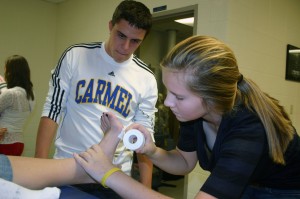By Lexi Muir
<[email protected]>
Senior Michael Benson doesn’t get to sleep in on Saturday mornings like most of his friends. Benson gets up every Saturday morning, leaves his house and heads to basketball practice. But when he gets there, he doesn’t put on his practice jersey and shoes like the players. Instead, because Benson is the team manager, he is in the gym early setting up for practice.
“I am there before and after practice everyday,” Benson said. “I’m behind the scenes, but I’m okay with that. If I didn’t like it, I wouldn’t do it.”
Benson said that he got started managing the basketball team sophomore year because Mark Galloway, head mens’ basketball coach here asked him about it.
- BANDAGED UP: Senior Michael Kremer and junior Kathryn “Katie” Hohn bandage an injured athlete’s foot. Kremer helps new trainer Hohn as a part of her training process. NICK JOHNSON / PHOTO
Senior Michael Kremer also arrives to womens’ basketball practice early and stays late. Unlike Benson, Kremer’s responsibilities are in the training room, icing, taping, stretching and helping players with rehabilitation. Kremer is a student athletic trainer here for women’s basketball. In his high school career, he has also worked with volleyball players, mens’ and womens’ soccer teams, mens’ and womens’ swimming and softball teams.
“My freshman year, I got hurt playing soccer and I liked being in the training room,” Kremer said. “I decided I wanted to be around sports, but not actually play them.”
Certified Athletic Trainer Dawn Robertson, one of the head trainers here for the past five years along with Chad Gabbard, said that without the student trainers, the athletic training here would not be nearly as effective.
“There is absolutely no way I could treat athletes at Carmel as well without (the student trainers),” Robertson said. “They are an extension of Chad and I.”
Kremer said that his favorite part about athletic training is helping the athletes to recover after an injury.
“I like being able to nurse athletes back to health and watch them recover,” Kremer said. “I like watching them be able to compete again.”
Both Kremer and Benson said that they feel just as much part of the team as any of the players. Benson said that he especially feels like part of the team because the players as well as Galloway make sure that he doesn’t go unnoticed.
“I have my own locker in the locker room,” Benson said. “I am definitely appreciated for what I do. Coach (Galloway) always says ‘A good manager is worth five players.’”
Kremer and Benson also said that they want to carry the skills they are learning into college and possibly even after that. Kremer said that he wants to go into the medical field for his career, but he is not sure what path he wants to take just yet.
Benson, however, already has high hopes to carry his managing career into college.
“I like the idea of being able to take (managing) beyond high school into college and even get a scholarship for it,” Benson said. “I really want to go to Xavier next year to be the mens’ basketball manager there. Coach (Galloway) has been working a lot to help me get the scholarship and position.” Robertson said that this is the case for most student athletic trainers.
“The majority of them are looking into something in the medical field,” Robertson said. “This is a great way to get experience.”
The student athletic trainers and managers here put forth a total of 20 to 30 hours a week into their sport, which is equal to, if not more than, the amount of time the actual players spend in the gym. Robertson said that the trainers put in more time in the training room than the players put in the gym. “They are here an hour before and a half hour after,” Robertson said.
Robertson also said that the biggest difference between being a player on the team and being an athletic trainer (or manager) is that they are content on being in the background.
“(The student trainers) don’t need to be noticed to know that they did a good job,” she said.
As far as being “behind the scenes,” Kremer and Benson said they don’t mind being in the background. Benson said that as far as being recognized goes, the coaches and the players do a good job of appreciating everything that he does for them. He said he never feels unappreciated or under-recognized.
“Coach does a good job of recognition,” he said. “(The coaches and players) definitely notice me.”
Kremer said,” I’m okay with not getting acknowledged. That’s why I’m the trainer, not the player.”




























![Keep the New Gloves: Fighter Safety Is Non-Negotiable [opinion]](https://hilite.org/wp-content/uploads/2024/12/ufcglovescolumncover-1200x471.png)















































![Review: “We Live in Time” leaves you wanting more [MUSE]](https://hilite.org/wp-content/uploads/2024/12/IMG_6358.jpg)
![Review: The premise of "Culinary Class Wars" is refreshingly unique and deserving of more attention [MUSE]](https://hilite.org/wp-content/uploads/2024/12/MUSE-class-wars-cover-2.png)
![Introducing: "The Muses Who Stole Christmas," a collection of reviews for you to follow through winter [MUSE]](https://hilite.org/wp-content/uploads/2024/12/winter-muse-4.gif)
![Review: "Meet Me Next Christmas" is a cheesy and predictable watch, but it was worth every minute [MUSE]](https://hilite.org/wp-content/uploads/2024/11/AAAAQVfRG2gwEuLhXTGm3856HuX2MTNs31Ok7fGgIVCoZbyeugVs1F4DZs-DgP0XadTDrnXHlbQo4DerjRXand9H1JKPM06cENmLl2RsINud2DMqIHzpXFS2n4zOkL3dr5m5i0nIVb3Cu3ataT_W2zGeDAJNd_E-1200x884.jpg)
![Review: "Gilmore Girls", the perfect fall show [MUSE]](https://hilite.org/wp-content/uploads/2024/11/gilmore-girls.png)
![Review in Print: Maripaz Villar brings a delightfully unique style to the world of WEBTOON [MUSE]](https://hilite.org/wp-content/uploads/2023/12/maripazcover-1200x960.jpg)
![Review: “The Sword of Kaigen” is a masterpiece [MUSE]](https://hilite.org/wp-content/uploads/2023/11/Screenshot-2023-11-26-201051.png)
![Review: Gateron Oil Kings, great linear switches, okay price [MUSE]](https://hilite.org/wp-content/uploads/2023/11/Screenshot-2023-11-26-200553.png)
![Review: “A Haunting in Venice” is a significant improvement from other Agatha Christie adaptations [MUSE]](https://hilite.org/wp-content/uploads/2023/11/e7ee2938a6d422669771bce6d8088521.jpg)
![Review: A Thanksgiving story from elementary school, still just as interesting [MUSE]](https://hilite.org/wp-content/uploads/2023/11/Screenshot-2023-11-26-195514-987x1200.png)
![Review: "When I Fly Towards You", cute, uplifting youth drama [MUSE]](https://hilite.org/wp-content/uploads/2023/09/When-I-Fly-Towards-You-Chinese-drama.png)
![Postcards from Muse: Hawaii Travel Diary [MUSE]](https://hilite.org/wp-content/uploads/2023/09/My-project-1-1200x1200.jpg)
![Review: "Ladybug & Cat Noir: The Movie," departure from original show [MUSE]](https://hilite.org/wp-content/uploads/2023/09/Ladybug__Cat_Noir_-_The_Movie_poster.jpg)
![Review in Print: "Hidden Love" is the cute, uplifting drama everyone needs [MUSE]](https://hilite.org/wp-content/uploads/2023/09/hiddenlovecover-e1693597208225-1030x1200.png)
![Review in Print: "Heartstopper" is the heartwarming queer romance we all need [MUSE]](https://hilite.org/wp-content/uploads/2023/08/museheartstoppercover-1200x654.png)




